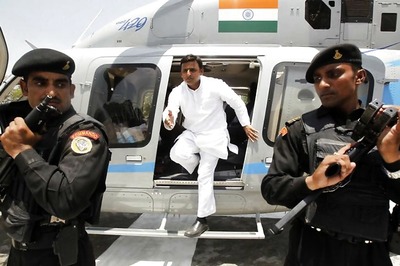
views
New Delhi: From leading the information campaign through RTIs to winning a case in the Supreme Court on Wednesday that now puts the office of the Chief Justice of India in the ambit of the RTI, it has been a long journey for RTI activist Subhash Aggarwal.
It started in 2007 with Aggarwal seeking a "copy of the resolution" that mandates every judge to make a declaration of their assets. After a number of legal ups and downs in a case that saw intense deliberation in the offices of the Chief Information Commissioner (CIC), the Delhi High Court, a 3 judge Supreme Court bench, and now the five judge constitution bench of the Supreme Court has delivered what Aggarwal describes as a "landmark judgment". Here are the edited excerpts of Aggarwal’s interview with News18.
How do you view the constitution bench's verdict?
I think it is a landmark judgment which will give a huge boost to our mission of transparency. This is a victory of the RTI Act. A lot of information asked by the citizens gets blocked by challenges in various courts. Now that the Supreme Court has adjudicated that even CJI's office is in the ambit of the RTI, it will be very helpful. It will have huge practical consequences.
There has been a lot of criticism against the RTI amendment bill by activists from across the country. A former Union minister described its approval in Lok Sabha as "a dark day for democracy". How do you view these developments?
I think the RTI Act in its absolute essentials has not been altered in the amendment. The tinkering has been done in cases like appointments, which some people have claimed will put the independence of RTI in severe danger. I think this is a question that the government is in a better position to answer.
A lot of criticism has also been levelled at the government for the increase in the number of pending RTI applications.
I have been a one-man army since day one. Earlier, I would file one RTI a day. But since I couldn't cope with all the work - filing RTIs, appealing against the non-disclosure of information at various levels - the frequency of my applications also reduced. I approached many NGOs seeking some assistance but didn't get any. I can only speak for myself, and my response is that though the number of RTIs I have filed has naturally decreased, none of them have been denied to me, I feel, due to "directions from above."
Also you see a lot of people confuse the RTI, which is a tool to get information, with a grievance redressal cell, which it is not. Whenever I go to college, schools, to instruct them on how to file RTIs, I tell them that this is a Right to Information tool, file it appropriately and you'll get the information that you desire.
Does today's judgment shed any light on whether collegium decisions will be made public?
For that I will have to go through the full judgment. In its judgment, the Supreme Court has said that if the Chief Public Information Officer intends to convey information, then he can seek comments from the "third party". Now if it is a communication between High Court judges and Supreme Court judges, then it is clear who the third party is. But in case of collegium, whether it will refer to the members of the collegium or the judges named in the proceedings of the collegium, one will have to wait to find out.
Some have argued that right to information could potentially clash with judicial independence.
Judicial independence should be supreme but that doesn't wash away the question of transparency. It began with me asking for correspondence between a High Court judge and the then Chief Justice of India in which the High Court judge had alleged that the union minister had tried to influence him. If that correspondence were to be provided it would have only strengthened the judicial independence, is my argument.
















Comments
0 comment